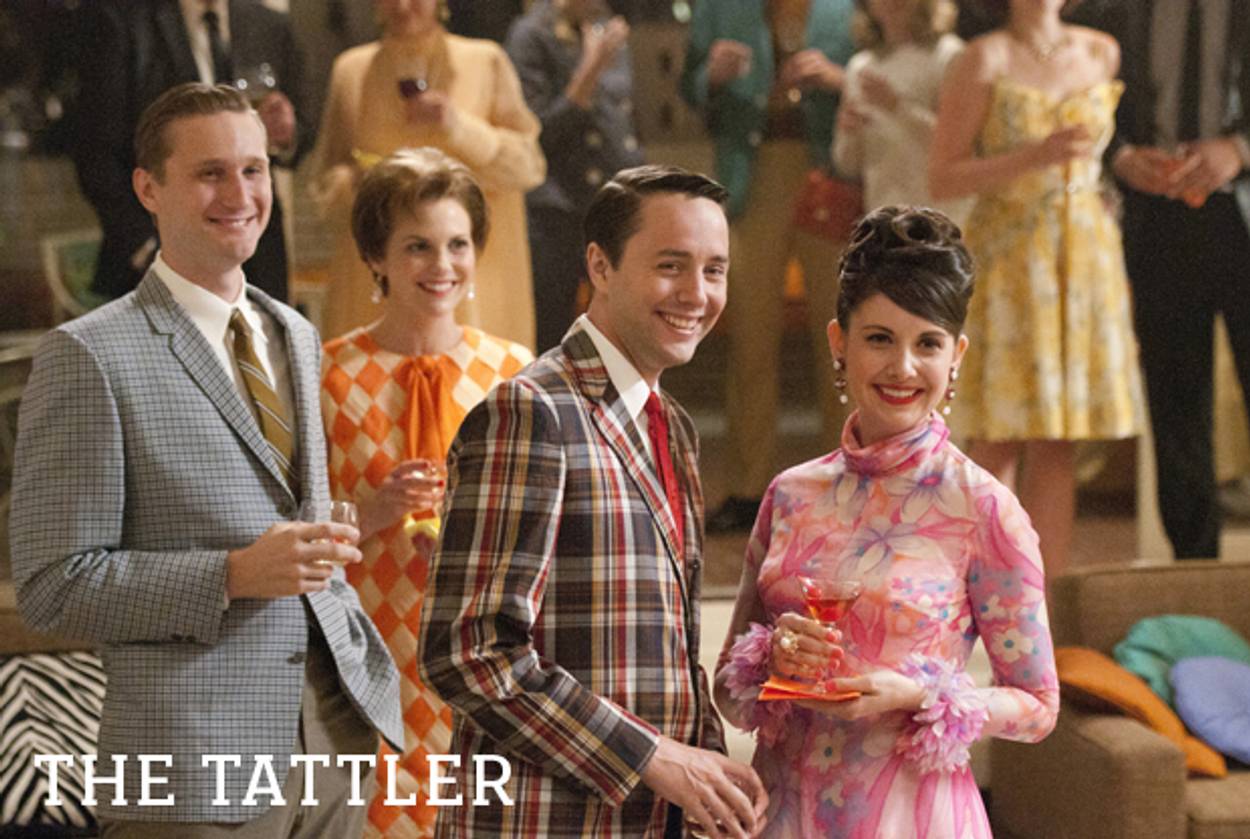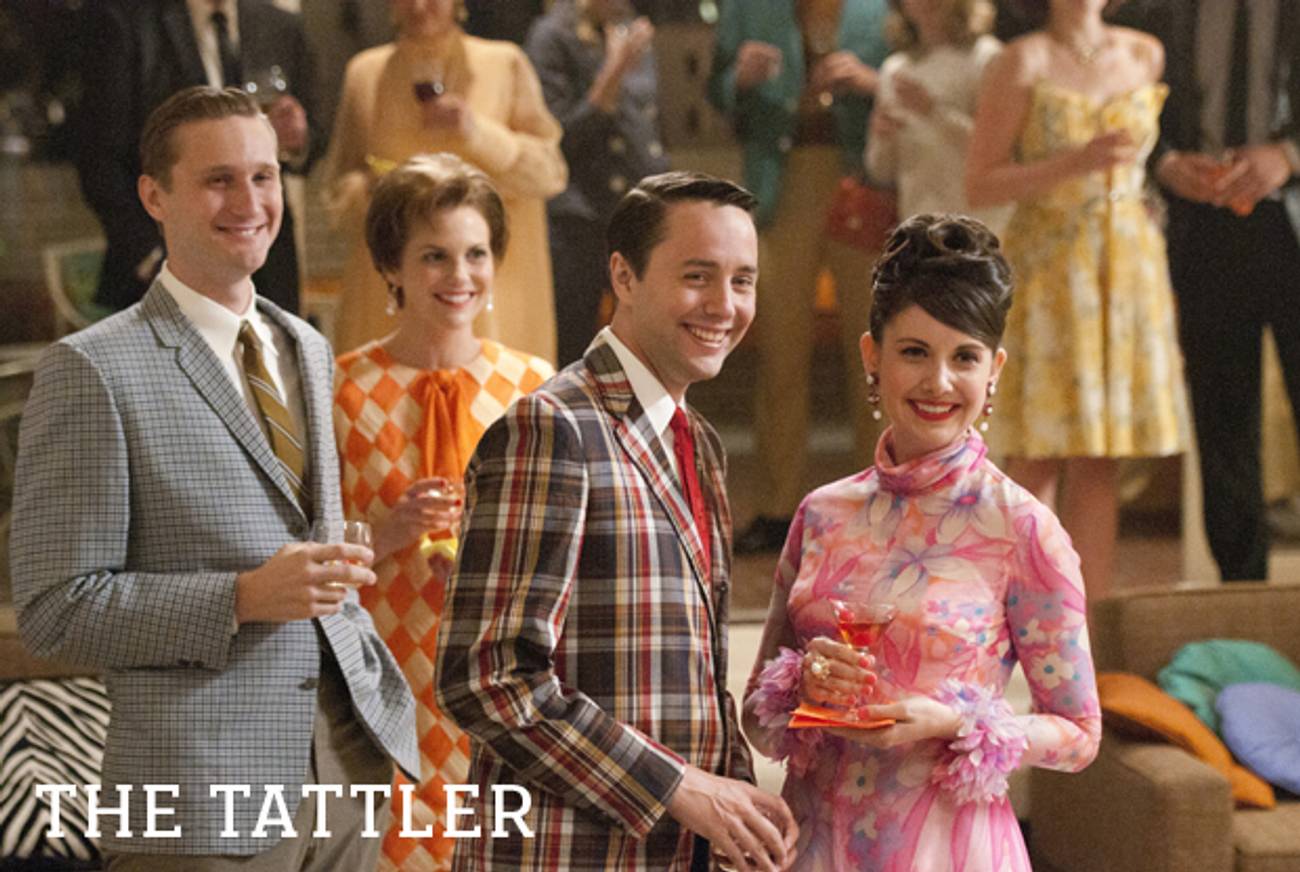Jew Pop
Mad Men, whose sixth season premiered Sunday, revives the 1960s, an era when Jewish culture and American pop began to meld




By the time Mad Men, Matthew Weiner’s seminal dissertation on the quiet desperation of the 1960s-era White American Male, has its Season Five premiere on Sunday night, Don Draper and his discontents will have been absent from our screens so long—not to mention those tense few weeks last year when it seemed like they might not return at all, giving those of us born after 1962 a taste of what the Cuban Missile Crisis must have felt like—that their impending return has a hint of the anti-climax about it; like when you finally open up the box with your wedding gown in it and think: “Oh, there’s that dress I ordered 11 months ago. I don’t remember the skirt being quite that poufy.”
Perhaps in an effort to convert any lingering wait-induced apathy into breathless anticipation, AMC has placed the strictest of embargoes on the advance screeners usually distributed to critics, journalists, and other interested parties, with the end result being that nobody in the Mad Men punditocracy—a group whose intellectual rigor and meticulous attention to detail the political commentariat would do well to emulate—has the slightest clue about what is going to happen this season, or even what year of the 20th century’s eventful seventh decade it will take place in, leaving us no choice but to dedicate our inaugural pieces (oh yes, there will be several) to more existential questions about the show’s appeal as a whole.
Why does Mad Men, despite being at times maddeningly slow and full of characters who remain maddeningly (if realistically) devoid of self-knowledge and personal growth, captivate us so? Like the song says, why oh why do we love it like we do?
Much has been made, and rightly, of the transformational aspect of the show’s ’60s setting: the Decade When Everything Changed. To paraphrase Harold Bloom’s Shakespeare analogy, if Shakespeare invented our modern conception of the human, the 1960s ushered in the America most of us know today: noisy, fractious, socially aware yet hopelessly narcissistic, grandiose yet paranoid, forever enmeshed in so-called “culture wars” that seem never to resolve. (The haughty doctor who tells Peggy Olsen how he’d “like to think” the prescription he’s giving her for the Pill won’t turn her into “some kind of strumpet” seems positively enlightened when compared to the bizarre Arizona bill requiring women to prove to their employers they at they aren’t using their birth control for, you know, birth control. The Orwellian dystopia begins in utero.) But something else was happening to the well-educated, coastal elites that Mad Men portrays that counts, at least in part, to the well-educated, coastal elites who Twitter, recap, and Tumblr their every move. Forget “The Greening of America.” In pop culture terms, the 1960s were the Jew-ing of America.
That’s not to discredit the contributions of earlier generations, of course. And it’s hard to say this sort of thing without sounding like one of those conspiracy-minded crazies clogging up comment feeds everywhere with increasingly unhinged references to “Mossad,” but we did kind of invent Hollywood. And Broadway. And popular song (read my friend David Lehman’s Nextbook Press-published A Fine Romance for an especially persuasive account of this last). But these contributions, however significant, sublimated their Jewishness in order to appeal to mainstream tastes: the cantorial throbs of George Gershwin or the melancholic cadences of Irving Berlin were muffled by the swish of Fred Astaire’s tailcoat; Louis B. Mayer transmuted his longing for the shtetl into rapturous nostalgia for the kind of wholesome, small-town America that would have happily gathered outside his house with torches and pitchforks. But in the ’60s, as the old social structures began to crumble under the weight of social change and countercultural revolution, traditional norms of masculinity and femininity were called into question. Disillusionment with once-cherished institutions—the government, the military, organized religion—became widespread, and irony, irreverence, and skepticism were suddenly the watchwords of the day. (Sound like anyone we know?)
Enter the Jews of the entertainment industry, who for years had been honing their skills in front of microphones or behind cameras. Now they were suddenly empowered—even encouraged—to tell everyone what they really thought, and more importantly, as who they really were. Lenny Bruce made it hip to rail Talmudically against the entrenched hypocrisy of White America; Woody Allen made it sexy to be unable to fix a toaster or successfully shoot a moose. Music lovers could choose between the mordant cynicism and prophetic warnings of Bob Dylan or the depressive sensitivity of Simon and Garfunkel. Men who spent the decade pining for the chaste kisses of Doris Day closed it out ogling Barbra Streisand in her see-through Oscar pajamas.
The list goes on and on but perhaps the clearest indication of this shift in the American psyche is the legendary “You Don’t Have to Be Jewish to Love Levy’s” ad for rye bread put forth in 1964 by Dane Doyle Bernbach (the “hip”—read Jewish—agency whose equally famous “Lemon” ad for Volkswagen caused Don Draper such admiring consternation). The slogan was something of a revolution, not just for its innovative use of humor in advertising, but because of the knowing way it posited Jewishness as something familiar, and essentially lovable: a group of which one might not be totally horrified to find oneself a member. Rye is the new white; Jews are the new WASPs.
Of course, there’s a problem with fetishizing the outsider: Eventually, the outsiders become insiders, leaving a new class of people on the outside that may not have quite the same, shall we say, nuance. The classic Jewish superiority-inferiority complex—you know, according to which you hate yourself but still think you’re better than everyone else—is a hard equilibrium to maintain. Subtract the intelligence from the outrage, the self-deprecation from the self-importance, the sense of humor from the sense of otherness, and you get the War on Christmas. An entire group of self-appointed outsiders convinced they’re being horribly oppressed by the people who used to oppress them. Kvetchers, all.
That’s irony for you. For all the hand-wringing about assimilation, we didn’t turn into them. We turned them into us.
***
Like this article? Sign up for our Daily Digest to get Tablet Magazine’s new content in your inbox each morning.
Rachel Shukert, a Tablet Magazine columnist on pop culture, is the author of the memoirs Have You No Shame? and Everything Is Going To Be Great. Starstruck, the first in a series of three novels, is new from Random House. Her Twitter feed is @rachelshukert.
Rachel Shukert is the author of the memoirs Have You No Shame? and Everything Is Going To Be Great,and the novel Starstruck. She is the creator of the Netflix show The Baby-Sitters Club, and a writer on such series as GLOW and Supergirl. Her Twitter feed is @rachelshukert.